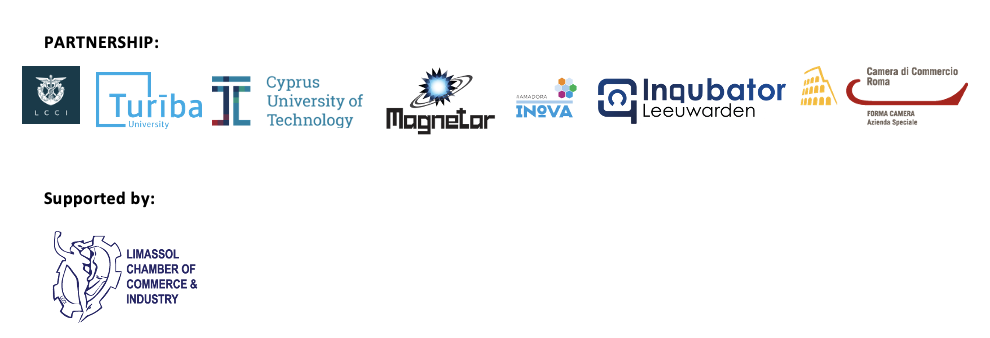NEWS
Turība University participates in the DIFILIM partner meeting in the Netherlands
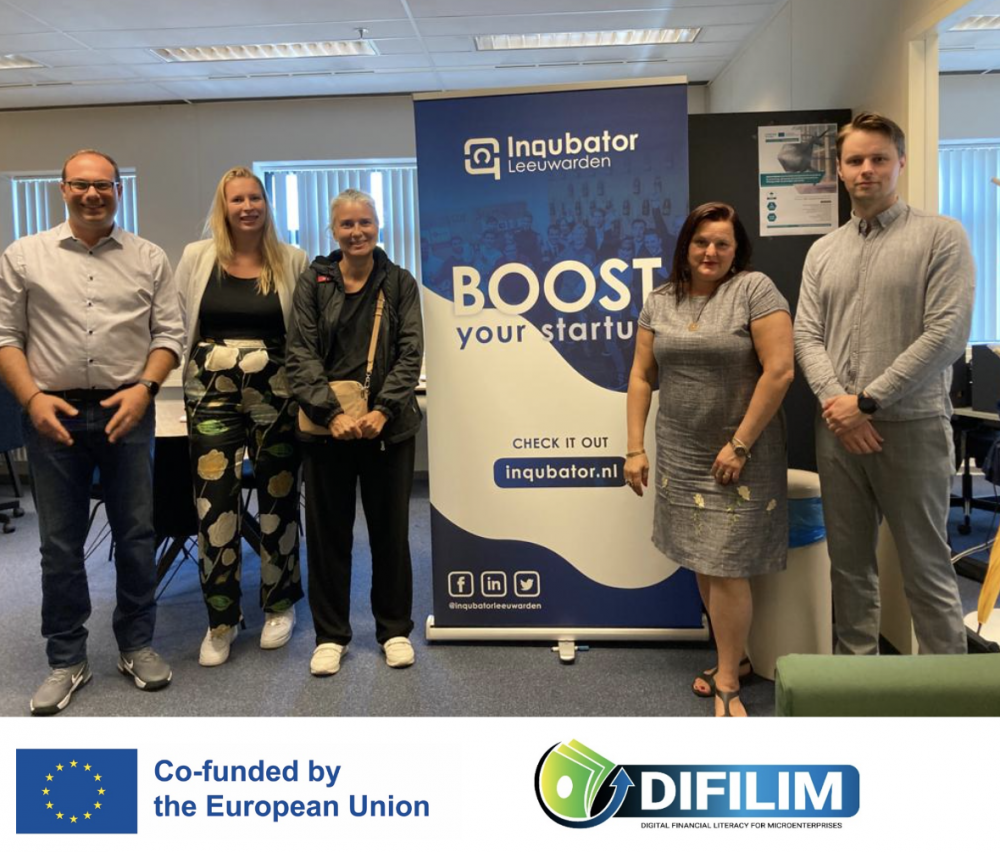
ERASMUS+ project “Digital Financial Literacy for Microenterprises” - DIFILIM.
Within the ERASMUS+ project DIFILIM "Digital financial literacy of micro-enterprises", the final partner meeting was held in the Dutch city of Leewarden. Project partners representing Turiba University, Cyprus University of Technology, Magnetar Ltd (Cyprus), Forma Camera, Special Agency of the Chamber of Commerce, Industry, Craft and Agriculture of Rome (Italy), Amadora Innovation E.M. Unipessoal Lda (Portugal), Stichting Incubator (Netherlands) came together to evaluate the results achieved in the project. The project conducted a study on digital financial literacy needs in each partner country; was created a report and guide for micro-enterprises on Digital Financial Literacy, which will be available in partner countries' languages; an online training platform has been created (found at https://difilim.eu/), where you can access training materials on finance and digitalization issues upon registration.
Within the framework of the project, training seminars have also been held in Latvia, Italy and Portugal - for entrepreneurs and other interested parties on financial and digital literacy. Seminars are also planned in Cyprus and the Netherlands.
1. Project result
The Project Result 1 considered research on the needs and impact of Digital Financial Literacy on enterprises in each Partner Country. The 'Digital Financial Literacy for Microenterprises' survey, which was distributed online by all partners, received a total of 134 responses which were analyzed and compiled into a report.
The main findings of the report can be summarized as follows: (i) The financial literacy of micro entrepreneurs is relatively low in most participating countries. On average across DIFILIM participating countries, only 11% of microenterprises' owners with up to 9 people and 19% of microenterprises' owners with 10-49 people showed high levels of financial literacy. (ii) Although the digitalization of many microenterprises is high, most microenterprises' owners report a lack of skills to support the digital transformation process. On average across DIFILIM countries, fewer than 40% of microenterprises with up to 9 people indicated that they have the necessary workforce and skillset. Relatively few businesses have a clear road map for implementing Industry 4.0 or know exactly what to do when it comes to digital transformation. (iii) At the same time, 43.28% of respondents answered that their business has received some form of support introduced due to the pandemic.
2. Project result
The 2nd project result consisted of two main deliverables:
• The DIFILIM European Report.
• Five partner countries' Guidebooks.
The DIFILIM European Report aims to describe and state the current situation of digital and financial literacy support, as well as policies in 5 partner countries – Latvia, Cyprus, Italy, Portugal and the Netherlands. Furthermore, the DIFILIM project sets out to identify the existing gaps in the financial and digital skills of entrepreneurs by surveying SMEs in all five partner countries. Based on the identified gaps, the training course and materials will be developed.
The report consists of 5 partner country analysis, arranged to give an overall introduction of the business environment and SME's role in it, then moving on to the specific initiatives and support in the five partners' countries, as well as describing the policies brought out in each country. At the end of the report, the structured analysis of all the support and policies available across the five DIFILIM consortium countries is carried out. This gives an overview of the current actions, as well as shows the challenges and gaps for financial and digital literacy.
The National Guidebooks help entrepreneurs and individuals in each partner country separately, to learn about the status and policies of Digital and Financial Literacy, existing opportunities for training and additionally comparison with the learning opportunities of the DIFILIM Project's Training Resources.
The main chapters of each national guidebook are listed below:
• Overview
• Financial Literacy status
• Digital Literacy status
• Existing Support for Financial Literacy
• Existing Support for Digital Literacy
• Cops
• Overview Table and Comparison With DIFILIM Provisions
• Financial Literacy Roadmap
3. Project result
The main output of project result 3 is the multilingual project's website (difilim.eu). The website, in addition to general project information, contains the training resources of Digital and Financial Literacy connected to the DIFILIM theme. The total number of visits on the website upon project completion was over 3500 and the total number of registrations on the online training platform was 255.
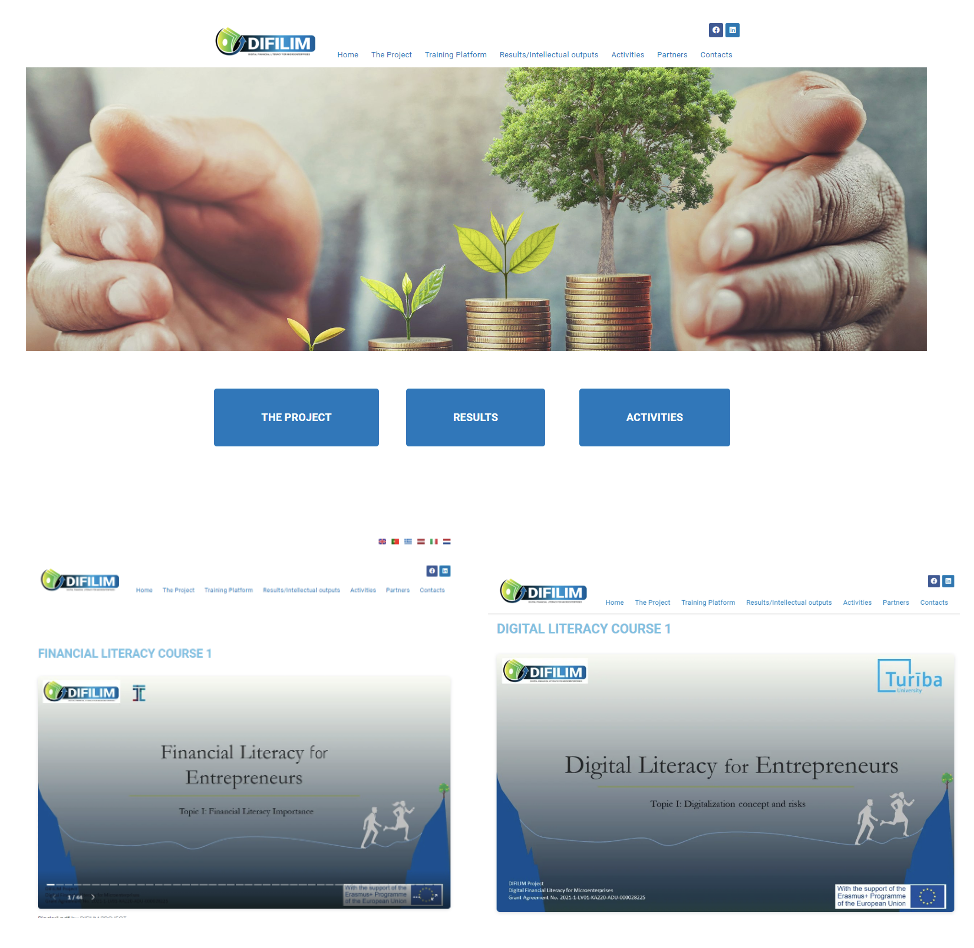
4. Project result
Project Result 4 started with a deliverable of a three-part Methodology concerning the overall management of tasks and monitoring of the Erasmus+ Project DIFILIM (Digital Financial Literacy for Microenterprises. It describes the following:
• The Implementation Plan of the project including division of tasks and timeline for each partner.
• The Monitoring and Quality Assurance Plan of the project including Annexes with questionnaires and monitoring tools.
• The General Dissemination Strategy of the activities and results of the project with useful templates.
Some dissemination campaigns that took place in social media are shown below:
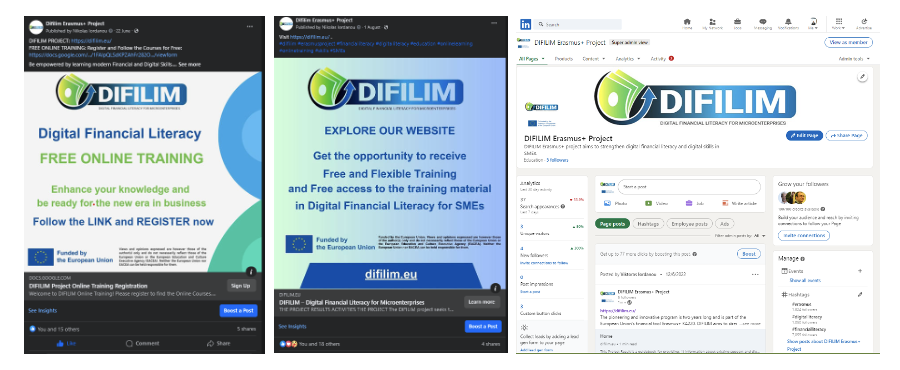
Multiplier Events and Training Activities
The DIFILIM Project partners organized 6 multiplier events in the 5 Partner Countries with almost 200 participants in total which included a training session after the presentation of the project and its results in each country.
The national events hosted a series of speakers/panelists who presented and discussed the findings and elaborated on the training and learning agenda to elevate the levels of digital financial literacy among micro-entrepreneurs.
The target audience included students and young people, youth entrepreneurs, start uppers, micro-entrepreneurs, SME owners and the public. The objective was to exploit the survey results to develop guidance aiming to inform the
training and learning agenda to support MSMEs and entrepreneurship, improve programme design and set forth some measurement and evaluation tools. The Dissemination Events - Workshop took place at the final months of the completion of the project.
All project activities were presented to the target audience and the stakeholders. Also, the training activities (face to face) took place on close dates or as a continuation of the Dissemination Event depending on the organizing Partner.
Target groups and participants included the General public, Established entrepreneurs, Future entrepreneurs, Enterprises and Industry personnel, University Students
Stakeholders included Chambers of Commerce and Industry, Business Organizations and Associations, VETs, Universities, Accelerators, Incubators.
Stakeholders who play the role of intermediary bodies between individuals and final successful business development, benefit from the set of tools and material that were created through the project.
A very important part of the Dissemination event was the presentation of the e-Learning platform and the implementation of the training workshop that described all parts of the online tools, and the target audience was trained on the use of it.
Online training in all partner countries took place on the last quarter of the project, giving the opportunity to as many participants to use the tools-service and follow the courses to also provide feedback for improvement. More than 250 participants registered for the online courses.
Dissemination Event and training in Latvia:
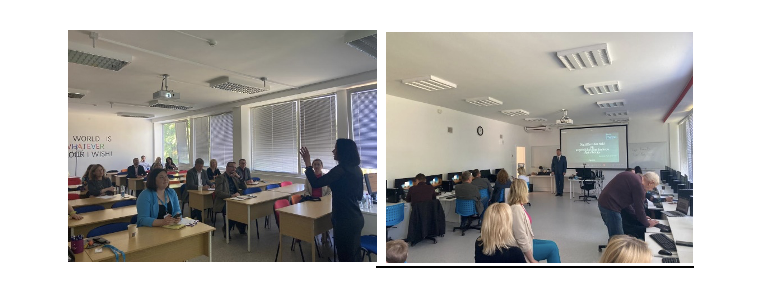
Dissemination Event in the Netherlands:
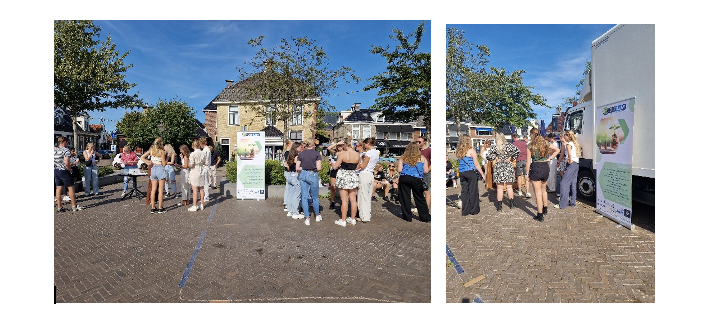
Dissemination Event and training in Cyprus:
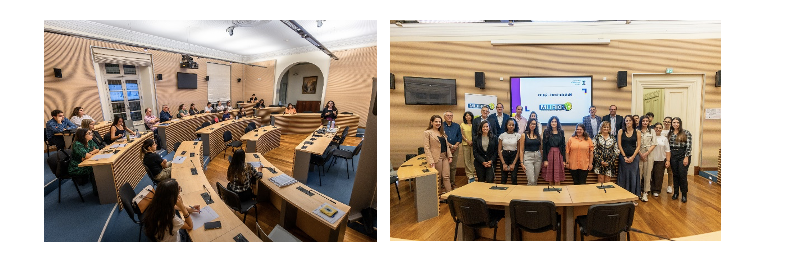
Follow DIFILIM in social media - on Facebook and LinkedIn.
Project is co-financed by ERASMUS+ programme.
Project number: 2021-1-LV01-KA220-ADU-000028225
